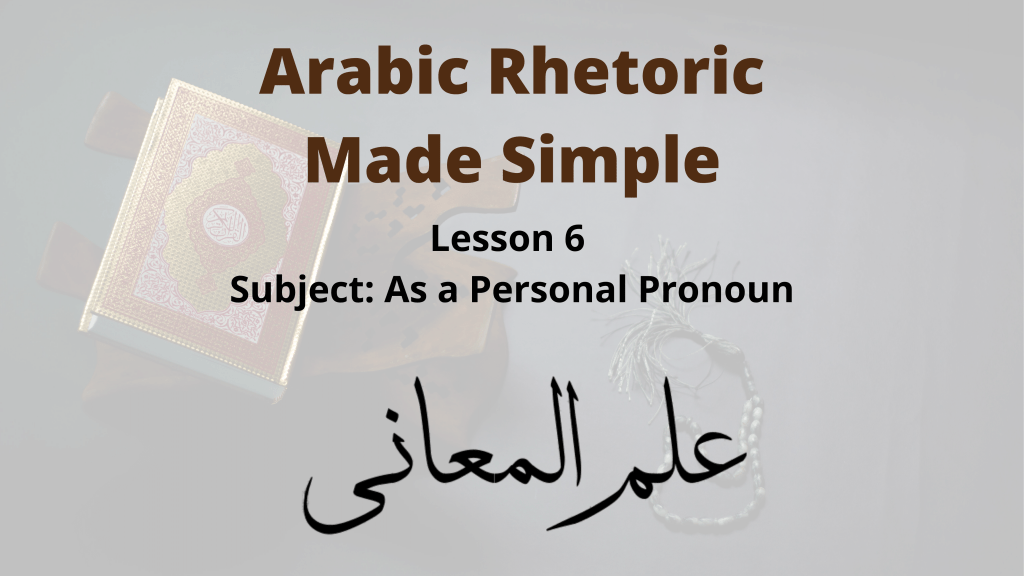
Previously we learnt when to mention and when not to mention the subject of a sentence. In today’s lesson we want to start learning that if we do mention the subject, how should we express it.
As you have learnt from grammar, the subject of a sentence is typically definite and there are cases when it can be indefinite.
Furthermore, definiteness can be achieved in various ways as you see listed here:

Why express the Subject in the form of a Personal Pronoun?
What we want in Balagha is to understand why you would use these ways [the ways definiteness can be achieved], i.e. why use one of them instead of another one. Then we will talk about why you would want to leave the subject indefinite altogether.
In this lesson, we are going to focus on expressing the subject of a sentence as a personal pronoun.

If you are talking about yourself, i.e. you are the subject of the sentence, then you are pretty much compelled to use the first-person pronouns: “I” or “we”.
If the subject is your audience then you are pretty much compelled to use the second person pronoun: “you”.
If you are talking about some third party, then you can use the third person pronoun: “he”, “she”. “it”, “they” and so on. But now you have the option of also using one of the other methods that you saw on the previous slide.
Why would you use a third person pronoun, instead of one of the other methods?
That is a valid question. It doesn’t apply to the first person or second person because you have to use a personal pronoun. But in the case of the third person e.g. why would you say: “He is here”, using a personal pronoun, instead of saying: “Zaid is here”, using a proper noun. Or “That guy is here”, using a demonstrative pronoun, or “The guy who we are talking about is here”, using a relative pronoun.
Basically, what is the benefit of personal pronouns from a Balagha perspective?
There is no rhetorical reason really. You simply use pronouns because the noun has already been mentioned and you want to refer to it in a concise way which is partly why pronouns are short words.
You don’t want to have to keep saying: “Zaid came, Zaid took off his coat and Zaid greeted us”.
That’s it, there is really no other special reason other than that.
There are some special rhetorical devices related to pronouns, like وضع المضمر موضع المظهر . Those will come later insha’Allah.
The Generic “You” in Arabic
There is something interesting here, it is called the generic “you”.
In Arabic sometimes when you use the singular second person: أَنْتَ. You are not talking to anyone specific. It is a general address. This happens in English too. When I say: “As you have learned from grammar”. With “you” I don’t mean “you” as in some particular person, I mean anyone reading my words.
For example, Allah says:

The “you” (in “If only you could see…”) is singular when talking to one person. Here Allah is not actually talking to the Messenger (peace be upon him) or a particular person, He is making a general address. Why didn’t Allah just say: وَ لَوْ تَرَوْنَ, using the plural?
What is the rhetorical benefit of using the generic “you” over the plural “you”?
In plural you are speaking to a group. What you are saying will be true, whether it applies to all of the people of the group, or even just the majority of them. If I say: “You guys are in trouble”. Even if most of you are in trouble, but not all of you, what I said is still valid. But with the generic “you”, what you are saying applies to every single person capable of being an addressee of your speech. i.e. every single person listening to you. When Allah says: وَ لَوْ تَرى “If only you could see..”, Allah is speaking not to everyone as a group but to everyone on an individual basis, i.e. everyone listening to this verse and it is at a personal level because it is one to one.
- Proceed to next lesson: Expressing the Subject as a Proper Noun
- Return to index page: Intro to Ilm Ul-Ma’ani
- Start free lessons: Sign Up for Free Mini-class